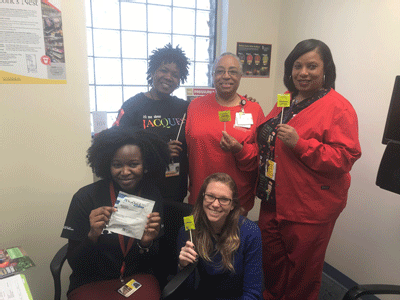One in 43 individuals in Baltimore over the age of 13 is living with HIV, stunning statistics provided by the University of Maryland Medical Center. However, officials at UMMC are continuing to do their part in trying to curtail the deadly illness.
On World AIDS Day on December 1, for instance, health officials provided free and confidential HIV testing, prevention tips and access to care.
The free testing sponsored by the UMMC Community Outreach and the JACQUES Initiative, a program of the Institute of Human Virology at UMMC, was part of World AIDS Day to raise awareness about HIV and eliminate the stigma that surrounds it.
It’s also part of an overall goal to provide testing to at least 20,000 people and get people who test positive into treatment.
“HIV can be treated if you are willing to take your medication as prescribed and see your primary care doctor as directed for routine check-ups,” said Cynthia Richardson, Linkage to Care Navigator, at the JACQUES Initiative who is living with HIV. “HIV is not a death sentence, it’s a life sentence if you are willing to be compliant and willing to be linked into care. You can live a normal life.”
Dr. Sarah Schmalzle, an assistant professor of medicine in the infectious diseases division and the medical director of the Center for Infectious Diseases in the Institute of Human Virology at the University of Maryland School of Medicine says it’s always difficult for doctors to break bad news to patients, including an HIV diagnosis.
“In the case of HIV, the added difficulty is knowing how emotionally devastating this news can be to the recipient. People can react very differently [which] can range from being relieved to know; feeling guilty about others they may have transmitted the virus to; wondering how they became infected; being angry; or even being in denial,” Dr. Schmalzle said.
“This means that in addition to a new illness, they may also have a lot of other emotions to contend with and work through. One thing we try to do is have an HIV counselor with us when we break the news,” she said, adding that some counselors are people living well with HIV themselves. “They can talk to patients from their own experience, which people find very comforting.”
Maryland has one of the highest rates of HIV diagnosis in the country. Statistics also show that one in two black men who have sex with men and one in four Latino men who have sex with men will be diagnosed with HIV during their lifetime.
The JACQUES Initiative offers targeted community-based testing throughout West Baltimore and although there are some who are nervous about testing, linkage and retention in HIV care are even larger challenges, according to Sally Bjornholm, program manager for HIV/HCV Routing Testing and Linkage to Care at the JACQUES Initiative.
“There are a number of barriers to care and treatment that are faced by persons living with HIV in Baltimore, including homelessness, poverty, stigma, health literacy, transportation, mental illness, substance abuse and other health disparities,” Bjornholm said.
Even though most people know there is treatment for HIV, there may be misperceptions about how the treatment works, side effects and even the cost of HIV treatment, said Dr. Jamie L. Mignano, executive director of the JACQUES Initiative.
“Many people may not be aware that in Maryland, HIV treatment is available to everyone, thanks to the Maryland AIDS Drug Assistance Program, even persons without insurance can access treatment,” Mignano said.
There are also many in Baltimore who know someone who has died as a result of AIDS before good treatment was available or because of limited access to regular care.
“These experiences may cause uncertainty and fear,” she said, adding that many new cases of HIV in Baltimore are among young African American of the same gender. “This population face multiple challenges and HIV provides a double stigma. Therefore members of this population may be less likely to get tested and therefore risk getting sick from HIV if they are infected due to not knowing their status and getting care and treatment.”
However, there is good reason to be optimistic.
“If you have not been tested for HIV, the time is now,” said Richardson, who has lived with the illness for some time. “It’s better to know your status than to not know. You can live well with HIV, I’m living proof!”
